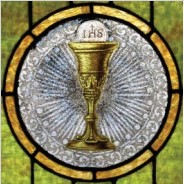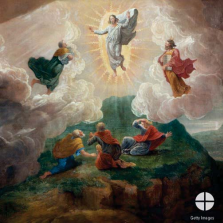The readings this weekend remind me of a country western song by Tim McGraw. It’s a song about a man in his forties who has been given the shocking diagnosis of an illness that will end his earthly life. He responds to this devastating news by intentionally choosing how he wants to live the remainder of his days on earth. The lyrics gave me pause, not because the concept is new but because, of late, my own immortality has come to the forefront—though I keep trying to push it back.
Within the past couple of months I have had the privilege to accompany family members as they bury loved ones who are younger or just slightly older than I. And it seems this is the case in the recent stream of communications I have been receiving about those who are very ill or are journeying home to God, some of whom I have been gifted to visit. In all of these situations there has been no fluff, no non-essentials; conversations are all about things that truly matter or there is just a quiet “being with” as I internally acknowledge with gratitude that I am on holy ground and that the presence of God is permeating in and around us.
As the country western song continued, I was disappointed when the man began relaying the “bucket list” of things he did after he got “the news,” like skydiving, rocky mountain climbing and riding a bull (it is country western, after all.) But then … I heard him say also that he loved deeper, spoke sweeter, gave the forgiveness he had been denying, became a better husband and the kind of friend one would like to have. He even began reading “the Good Book.” And then it occurred to me that the songwriter was describing the kind of balance we are called to live in life—intentional time for self, others, and God in a way that demonstrates who we truly are as precious children of God.
Our lives tend to take on a pace that can rob us of this kind of intentional living. I guess some might say that if one is fortunate enough not to die suddenly, there can be some intentionality to the way one decides to live the rest of one’s life. But in reality, we already know that life on earth is temporary whether we die young or after a length of days. We don’t have to wait for medical professionals to tell us that it’s going to end. We know this early on in life. It occurred to me that this knowledge is truly a gift because it can allow us to choose how to live our lives today with the deliberateness of faith-filled people, trusting that God is with us just as He was with the Israelites in the desert as described in today’s first reading; just as He has been from the beginning of time and will be forever.
As St. Paul states in today’s second reading, “I declare and testify in the Lord that you must no longer live as the Gentiles do, in the futility of their minds; that is not how you learned Christ … so put away the old self … and be renewed in the spirit of your minds, putting on the new self, created in God’s way in righteousness and holiness of truth.” And in today’s Gospel, Jesus enjoins us “not to work for food that perishes but for the food that endures for eternal life.” As a prominent writer posited, our eternal life does not begin when we die … it begins the moment we are conceived for it is then that we begin our journey with God. We are called to live in the fullness of God’s love and presence in the here and now on this side of the veil, not only after we transition to the other side.
And so, we are called to live each day, dying in an ongoing way to those parts of ourselves and things in our lives that get in the way of our taking responsibility for the wellbeing of ourselves, others and our world. Jesus is our North Star. He is “the way, the truth and the life.” He has modeled and spoken about a way of life that gives us life, and he remains with us always so that we might have life “to the full.” If we believe this, how then shall we live?
Sr. Nancy Citro, SNDdeN

Eighteenth Sunday in Ordinary Time
July 31, August 1, 2021
In today’s Gospel we hear Jesus proclaiming that he is “the bread of life.”
He then offers an invitation to come to him. For us, the invitation is to live the Eucharistic life in Christ.
What does it mean for our parish family to live together in the Eucharist?
What does it mean for us to share the Eucharist together, to participate in the “bread of life” together?
Does it mean we love each other, support our community of faith, work together?
Do we carry each other’s burdens? Celebrate our joys?
What are the practical implications of being good stewards of our Eucharistic life together.

The Transfiguration of the Lord – August 6, 2021
In Year B, the reading for the Transfiguration comes from Mark’s gospel. (The Transfiguration also appears in the other two synoptic gospels, Matthew and Luke.) In Mark, Jesus takes Peter, James, and John up a high mountain, apart from the other apostles and disciples.
There, Jesus is transfigured (changed in form and appearance) and appears in dazzling white clothes. Elijah, the great prophet, and Moses, through whom the Israelites were given the law, appear with Jesus. A cloud appears, overshadowing them, and a voice states, “This is my beloved Son. Listen to him.” Jesus charges the three to not share with anyone what they had seen “except when the Son of Man had risen from the dead.” They keep their experience to themselves, pondering what Jesus meant by rising from the dead.
How are we to understand the Transfiguration? The story of the Transfiguration is also proclaimed on the second Sunday of Lent—a key part of Jesus’ journey towards the Cross. The Catechism of the Catholic Church draws parallels between Jesus’ Baptism and the Transfiguration. Jesus is baptized at the start of his public ministry. His baptism proclaims the mystery of our first regeneration—we die and rise again with Christ. The “Transfiguration ‘is the sacrament of the second regeneration’: our own Resurrection (St. Thomas Aquinas, STh III, 45, 4, ad 2). From now on we share in the Lord’s Resurrection through the Spirit who acts in the sacraments of the Body of Christ.
The Transfiguration gives us a foretaste of Christ’s glorious coming, when he ‘will change our lowly body to be like his glorious body (Phil 3:21)’” (Catechism of the Catholic Church, no. 556). During the Prayer after Communion, we pray that God might “transform us into the likeness of your [his] Son, / whose radiant splendor you willed to make manifest / in his glorious Transfiguration.” The Collect, or opening prayer, tells us that the mystery of the Transfiguration “prefigures our full adoption to sonship.” The Transfiguration, initially revealed to Peter, James, and John, reveals to all of us a taste of what is yet to come.
The Transfiguration is the fourth of the Luminous Mysteries of the Rosary.
Copyright © 2021, United States Conference of Catholic Bishops, Washington, DC. All rights reserved.
